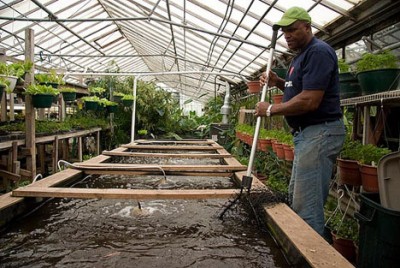 Ezra KleinLindsay Beyerstein“Edible Media” takes an occasional look at interesting or deplorable food journalism on the web.
Ezra KleinLindsay Beyerstein“Edible Media” takes an occasional look at interesting or deplorable food journalism on the web.
Welcome to the table, Ezra Klein
When I first started writing about food politics in 2005, the topic area was highly stratified–and still a little obscure. There was Eric Schlosser’s groundbreaking Fast Food Nation (2001) illuminating the topic and pointing to new avenues of inquiry; you had Michael Pollan writing big essays in The New York Times Magazine (Omnivore’s Dilemma didn’t appear until 2006); and people like Marion Nestle, Gary Paul Nabhan, and Anna Lappe writing provocative books for relatively small audiences. In old foodie enclaves like The New York Times Wednesday food section and Gourmet Magazine, political articles had started to creep in at the margins.
And there was a small, nascent food-pol blogosphere–a few people strewn about the country pecking away without pay on the outrages of the food system and emerging alternatives. I joined their ranks, bewildered at the prospect of writing for free. (I had always generally followed Nabokov’s rule : “I write for pleasure, but publish for money.”)
Few people outside the sustainable food movement were questioning the food system and how it got that way. I remember a lot of smart people, old friends from previous lives, who had no idea what I would be writing about. “Is this the kind of stuff that would appeal to Whole Foods shoppers?” a college-days comrade asked.
Pollan cast a long shadow. Not long after Omnivore’s Dilemma came out, a friend who’s an established writer asked me: “Are you just chasing Michael Pollan’s tail?” The idea had never occurred to me. The topic is so rich, so multi-faceted, and so endlessly complex, and Pollan and I brought such radically different skills and perspectives to the table, that I never once thought, “Well, he’s got that one sewn up. Maybe I’ll focus on water?”
I suppose, on our farms as well as in the life of the mind, monocultures tend to hold sway here in the United States. Writing in The Nation last year, the literary critic William Deresiewicz observed that “An iron law of American life decrees that the provinces of thought be limited in the collective consciousness to a single representative.” He went on:
Like a poor man’s Noah, we take one of each. One physicist: Stephen Hawking. One literary theorist: Harold Bloom. One radical social critic: Noam Chomsky. Before her death, we had one intellectual, Susan Sontag, and one only. (Now we’ve dispensed with the category altogether.) We are great anointers in this country, a habit that obviates the need for scrutiny. We don’t want to have to go into the ins and outs of a thing–weigh merits, examine histories, enter debates. We just want to put a face on it–the logic of celebrity culture–and move on.
I’m happy to say that we’re challenging that state of affairs in the food-politics world. A prodigious, if still woefully underfunded food-poltics blogosphere–mapped out recently by Paula Crossfield on Mark Bittman’s blog--cranks out ideas and perspectives that seep into and mainstream media and challenge received wisdom.
And now, The Washington Post has debuted a new biweekly food-politics column by the political blogger Ezra Klein. (Ezra is the second young political blogger to grab a big forum in the prestige print world– see Russ Douthat at The New York Times.)
Congratulations to Ezra, one of the most widely respected political bloggers out there. More food-politics columnists, please! It’s fantastic to see an august newspaper, still widely read by policymakers in the capitol, take the topic this seriously. It would be nice to see the column take its place on the Op-ed page with the quote-unquote serious opinion (it currently resides in the food section); but we’ll take what we get.
My advice to Ezra is this: Don’t submit to the creeping Broderism that haunts your new editorial home–a Beltway-centered worldview that hones in on narrow details within tightly defined debates, incapable of asking broader or even interesting questions. I would argue that it is Broderism–named after the hallowed and unreadable Post columnist–and not the Internet that has pushed the newspapers to the brink of irrelevancy. Food is such a beguiling, attractive, and vexing topic precisely because it is so broad and far-reaching. It refuses to stay between the lines. In your inaugural column, you write:
[I]t’s not that something is wrong with our food. It’s that particular things are wrong with our food. And knowing what those things are is the first step toward fixing them.
As you investigate the “particular things [that] are wrong with our food,” I think you’ll find yourself wandering into broader fields, including political economy (to speak nothing of science!). Our food system doesn’t exist, and wasn’t created in, a vacuum. And it won’t be “fixed” in a vacuum either. To put it crudely, if we’re going to be a nation populated largely by Wal-Mart workers earning near-poverty-level wages, then our food conglomerates had better know how to profitably crank out extremely cheap food–and they’d better employ a team of food scientists who know how to make it taste good.
That situation can’t be “fixed” by merely tweaking the Farm Bill or any other D.C. policy mechanism (as much as those mechanisms need tweaking). New food systems (note the plural) will require new economic models. It might be more fruitful to stop looking for for big fixes and start looking for alternatives–which are being constructed on the ground all over the nation and world.
At any rate, welcome to the table, Ezra. Bon appetit! And here’s to yet more new food-system voices in the media–especially ones from people-of-color communities who remain largely marginalized in these vital debates. Like farm fields and much else, public debate thrives on diversity.
 Will Allen tends a tilapia tank in an urban greenhouse. Will Allen, traveling in Fast Company
Will Allen tends a tilapia tank in an urban greenhouse. Will Allen, traveling in Fast Company
Speaking of alternatives, Will Allen of Growing Power has spent the past quarter century working in low-income areas of Milwaukee and Chicago to re-imagine the role of food in cities. Typically, big food conglomerates bring cheap food into the city; in return, wealth drains out–$1000 per capita per year, even in the poorest neighborhoods. In the bargain, people in low-income areas get the side effects of cheap food–high rates of diabetes, overweight, etc–and a few jobs of the clerk/burger-flipper variety.
With his urban-farming and community-owned market model, Allen re-conceives food as a community-level economic engine, not sieve–and as something that brings health, not maladies. It’s been great to watch Will, who recently brought home a MacArthur genius prize, get recognized and honored for his hard work. The latest: Fast Company has named him on of the “100 most creative people in business.” Here’s what Fast Company wrote:
If it were up to Will Allen, low-income urbanites would be cultivating fresh fruit, vegetables, and fish in community centers, in empty lots, even on their own rooftops. “People don’t realize that cities originally produced the food,” says Allen, an urban-farming expert who has pioneered a local-farming movement. Rather than bringing people back to the land, Allen’s methods of growing food and teaching urban cultivation are transforming the way low-income families can get safe, affordable meals. “Obesity, diabetes, and inadequate nutrition are increasing at an alarming rate, especially for the poor and people of color,” he says. He considers it a civil rights issue. “I’m interested in creating a more just food system. How do we get the same food to all people?”


